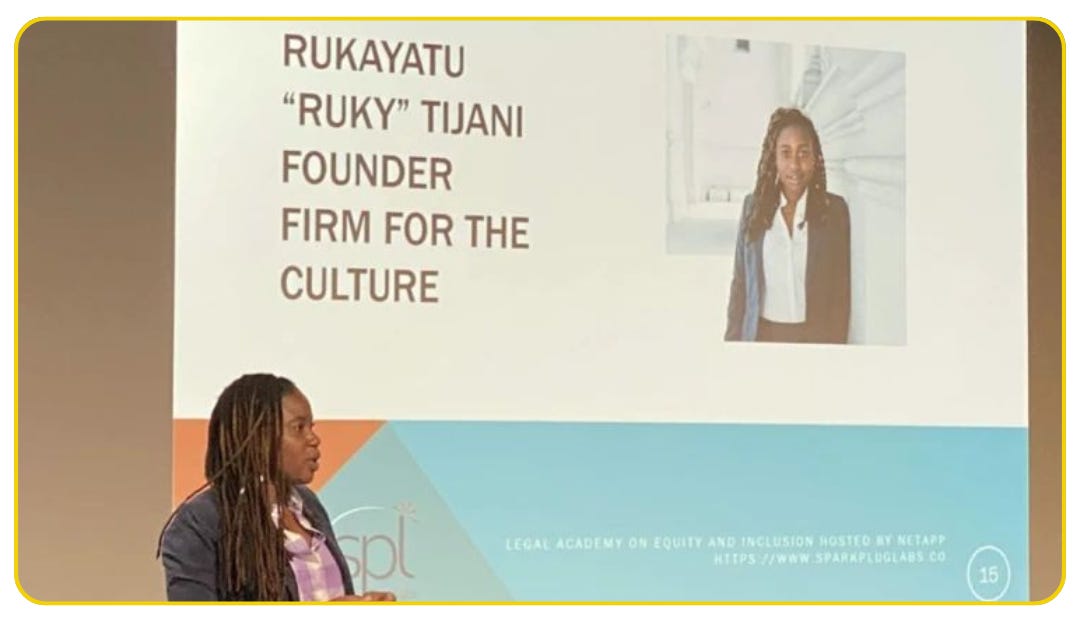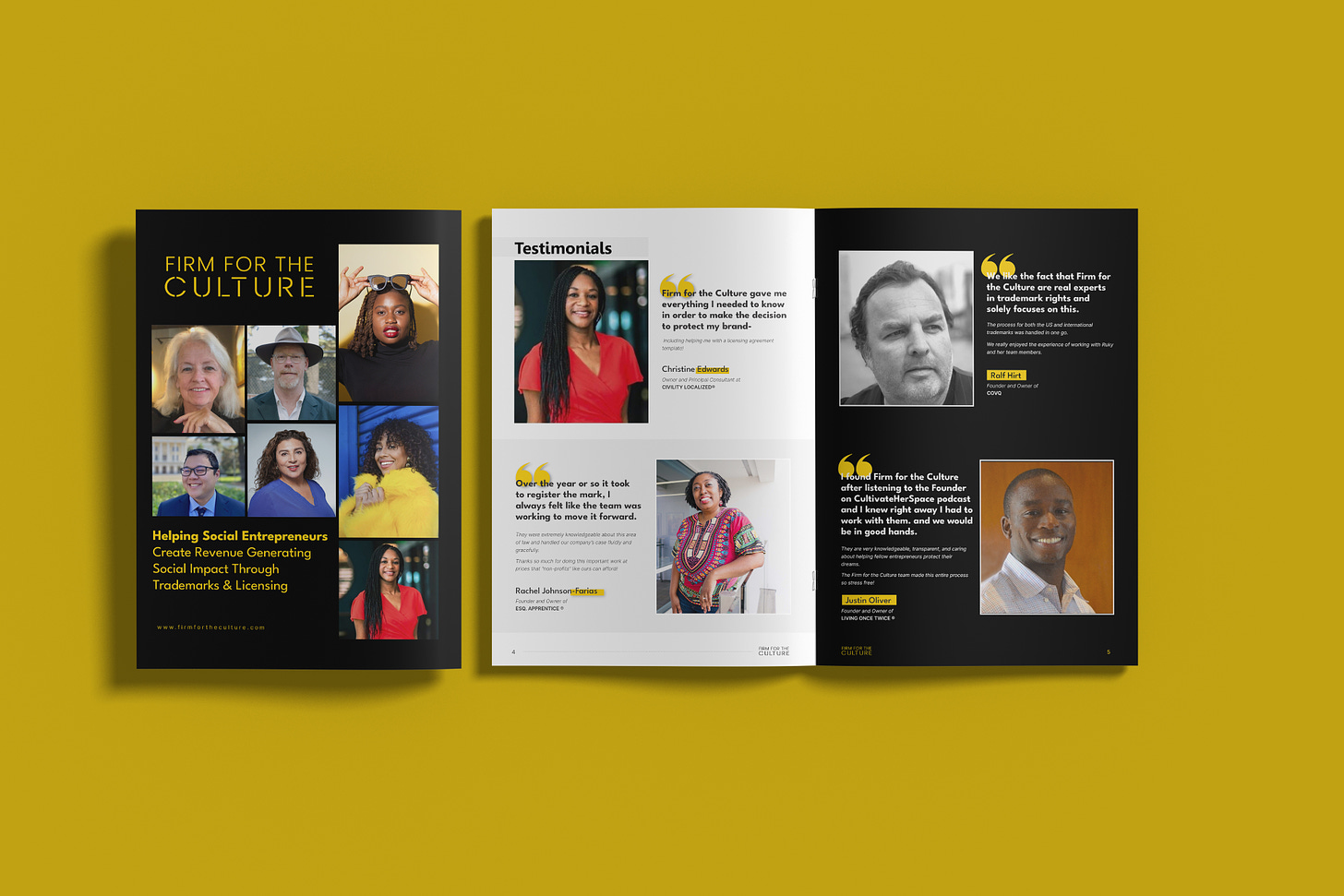Rest Is Revenue
How Intellectual Property Protection Lets Founders Rest While Their Assets Work | I Am What an Intellectual Property Attorney Looks Like.
Hey Fam,
Excited to speak with you again.
I gotta say, there’s something about being in the sixth full year of business that makes me super reflective.
Anybody else feel that way?
Looking back, I never imagined that Firm for the Culture would grow into what it is today.
In 2019, right around the time we launched Firm for the Culture, I gave a talk at NetApp and Sparkplug Labs about diversity, social impact, and the birth of my firm.
Back then, I shared why Firm for the Culture started; it allowed me and others an opportunity to see the law differently.
To see our place in the law differently.
And to understand that we mattered.
And that our creative contributions to the culture mattered as well:
But building a Firm that unapologetically reflected this sentiment was exhausting.
Let me tell y’all something: Business building is not for the faint of heart…
In order to remain on this journey without crashing out, I had to realize that rest is not a luxury—it is a necessity.
And not just for my well-being, but for the sustainability of the business and impact I wanted to create.
I built Firm for the Culture to ensure that underrepresented founders—people like me—could protect their ideas, secure their legacy, and let their intellectual property work for them.
Because here is the truth: intellectual property protection allows you to not have to “do it all.”
Your business, your brand, and your creative work should generate income—even while you rest.
So for this Founders’ Letter, we’re going to break down just how IP protection allows us to make money while resting.
Loving This Post?
Show us some love by adding a “❤️” or commenting below; this will make our hearts sing.
For too long, founders and creatives of color have been expected to overproduce, overextend, and overwork just to keep their businesses afloat.
But burnout does not just drain your energy—it exposes your business to risk.
Burnout leads to missed opportunities. When you are constantly working, you do not have time to explore passive revenue streams that could sustain you.
Exhaustion creates legal vulnerabilities. Without a true intention to have your trademarks, copyrights, or contracts in place, your hard-earned work can be stolen or misused—without legal recourse.
Doing everything yourself costs more in the long run. If your intellectual property is not protected, you could be leaving thousands (or millions) of dollars on the table.
You do not need to keep grinding just to survive.
You need to protect what you have already built—so it works for you while you recharge.
Your business name, logo, and tagline are valuable assets. A federally registered trademark ensures that no one else can profit off your brand.
Without a trademark, your brand can be stolen, diluted, or misused.
With a trademark, you own exclusive rights to your name and can license it for passive income.
You can take legal action if someone tries to profit from your identity—without your permission.
If you create content—whether that is books, music, videos, courses, or marketing materials—securing a copyright means you control who can use, sell, or adapt your work.
Without copyright protection, your content can be copied, repurposed, or resold without credit (or payment).
With copyright, you can license your work to media companies, institutions, or brands—and collect royalties.
Your creative work can continue to earn you money—even when you are on vacation, spending time with family, or just taking a day off.
Creativity should not just be celebrated. It should be protected and monetized.
Licensing is one of the most powerful ways to make money while you rest. Instead of trading time for dollars, licensing allows you to sell the rights to use your work while retaining ownership.
Created an online course? License it to schools, businesses, or training programs.
Designed a logo? License it to brands that want exclusive rights.
Built a unique business method? License it as a framework for consultants.
Licensing allows you to scale your impact without scaling your exhaustion.
If you have a team, freelancers, or collaborators, make sure your contracts are airtight. Just because someone creates something for your business does not mean you automatically own it.
Use a Work-for-Hire Agreement – If an independent contractor designs your logo, writes your marketing copy, or builds your website, that work belongs to them unless explicitly assigned to you.
Require Copyright Assignments – When hiring employees or freelancers, ensure that their work is legally transferred to your business via a copyright assignment agreement.
Define Licensing and Usage Terms – If you are collaborating on content or products, ensure contracts spell out exactly how each party can use the final work.
For founders and creatives of color, rest is more than a break—it is a business strategy.
When you protect your brand, you create opportunities for licensing and partnerships.
When you secure your copyrights, your content continues to generate income—without additional effort.
When you solidify your contracts, you ensure that the work done for your business stays your intellectual property.
You deserve to rest. But more importantly, your business should still thrive while you do.
At Firm for the Culture, we specialize in helping founders, creatives, and entrepreneurs legally protect their intellectual property so their businesses can thrive—even while they rest.
Trademarks – To secure your brand and prevent copycats.
Copyrights – To protect and monetize your creative work.
Licensing Agreements – To create sustainable revenue streams.
Work-for-Hire and Copyright Assignments – To ensure everything made for your business belongs to you.
Before burnout sets in, ask yourself:
Is my intellectual property protected?
Is my work legally positioned to make me money while I rest?
Do I have the right contracts in place to secure my brand and my business?
Need Help Protecting Your Creativity?
If you are unsure—or if you know you need to take action—reach out to us.
We have helped countless founders and creatives safeguard their intellectual property, and we would love to do the same for you.
Because you deserve to rest—and your business deserves to keep growing while you do.
How can founders protect their intellectual property so their assets work even while they rest?
I’d love to hear your thoughts—drop a comment or reply with your insights!
If you need further guidance, reach out to me and my team at Firm for the Culture.
We’re here to help you navigate the copyright, trademark, and thought leadership journey.
Can’t wait to help you protect your dynamic impact.
And #ThatsAWrap
The Doors of the Church Firm Are Open
Thanks for reading.
See you next time.















This is maybe the most powerful of your newsletters I've read, Ruky...from a marketing standpoint.
There's real energy in terms like 'underrepresented founders'...not something old white guys are used to seeing (or thinking about).
And it speaks to your success being forged through a journey that was tough every step of the way. Which speaks to how bloody good you and your team are.
"An opportunity to see the law differently...to see our place in the law differently" is also compelling. Your authenticity and the personal touch are always powerful.
Hope to work with you guys some day.
Brava!